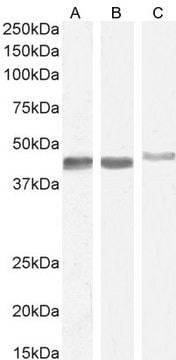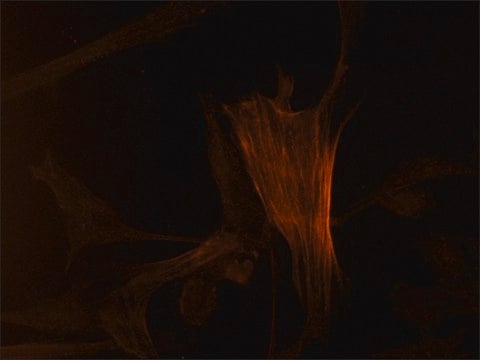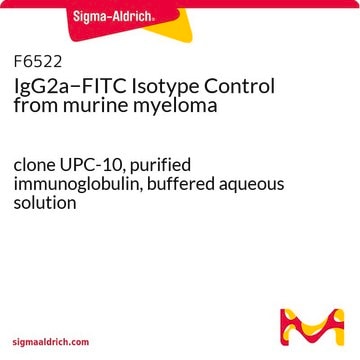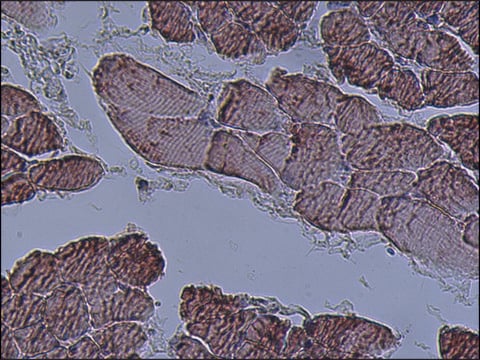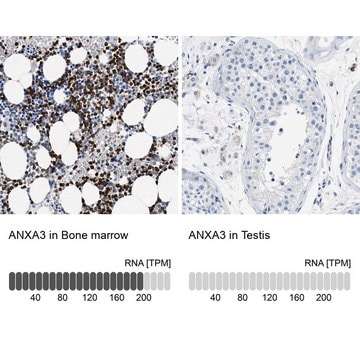F3777
Anticorps monoclonal anti-α-actine de muscle lisse
clone 1A4, purified from hybridoma cell culture
Synonyme(s) :
SMA
About This Item
Produits recommandés
Source biologique
mouse
Conjugué
FITC conjugate
Forme d'anticorps
purified from hybridoma cell culture
Type de produit anticorps
primary antibodies
Clone
1A4, monoclonal
Forme
buffered aqueous solution
Poids mol.
antigen ~42 kDa
Espèces réactives
human, mouse, rat, chicken, frog, canine, rabbit, guinea pig, goat, bovine, sheep, snake
Technique(s)
immunohistochemistry (formalin-fixed, paraffin-embedded sections): 1:500 using human tonsil or appendix
Isotype
IgG2a
Numéro d'accès UniProt
Conditions d'expédition
dry ice
Température de stockage
−20°C
Modification post-traductionnelle de la cible
unmodified
Informations sur le gène
human ... ACTA2(59)
mouse ... Acta2(11475)
rat ... Acta2(81633)
Vous recherchez des produits similaires ? Visite Guide de comparaison des produits
Description générale
The antibody reacts with normal and neoplastic, human vascular and visceral smooth muscle cells. It reacts with normal myoepithelial cells, pericytes, eye lens cells, hair follicle cells and certain stromal cells in the intestine, testis, lymphoid organs, liver, ovary and bone marrow. The antibody also reacts with stromal myofibroblasts in hypertrophic scars, and in neoplastic tissues. α-smooth muscle actin is transiently co-expressed with sarcomeric α-actin during myogenesis in chicken and rat embryos. It was also found in the ventricular conducting tract of adult mammalian heart.
Spécificité
Immunogène
Application
Des tissus cardiaques de souris colorés au x-gal ont été analysés par IHC à l'aide de l'anticorps primaire monoclonal de souris anti-actine de muscle lisse afin d'identifier les myofibroblastes.
- immunohistochemical (IHC) staining of heart, lung, kidney, and liver of mice to examine the PHD2 deficiency in internal organs
- immunostaining to analyze vascular smooth muscle cells/pericytes development in platelet-derived growth factor (PDGFR) and PDGFR- β-/- embryos
- immunofluorescent analysis of implanted cells, frozen tissue samples to study the similar levels of expression of SMaA and SM-MHC as established primary SMC lines
- western blots of lens epithelial cells to determine the distribution of α-SMA expression in lens epithelial cell
- Immunohistochemical examination of lesion morphology
- flow cytometry
- immunohistochemistry, proliferation and TUNEL (terminal deoxynucleotidyl transferase (TdT) dUTP nick-end labeling) assays
- immunocytochemistry
Actions biochimiques/physiologiques
Forme physique
Stockage et stabilité
Autres remarques
Clause de non-responsabilité
Vous ne trouvez pas le bon produit ?
Essayez notre Outil de sélection de produits.
Code de la classe de stockage
12 - Non Combustible Liquids
Classe de danger pour l'eau (WGK)
nwg
Point d'éclair (°F)
Not applicable
Point d'éclair (°C)
Not applicable
Équipement de protection individuelle
Eyeshields, Gloves, multi-purpose combination respirator cartridge (US)
Certificats d'analyse (COA)
Recherchez un Certificats d'analyse (COA) en saisissant le numéro de lot du produit. Les numéros de lot figurent sur l'étiquette du produit après les mots "Lot" ou "Batch".
Déjà en possession de ce produit ?
Retrouvez la documentation relative aux produits que vous avez récemment achetés dans la Bibliothèque de documents.
Les clients ont également consulté
Notre équipe de scientifiques dispose d'une expérience dans tous les secteurs de la recherche, notamment en sciences de la vie, science des matériaux, synthèse chimique, chromatographie, analyse et dans de nombreux autres domaines..
Contacter notre Service technique





